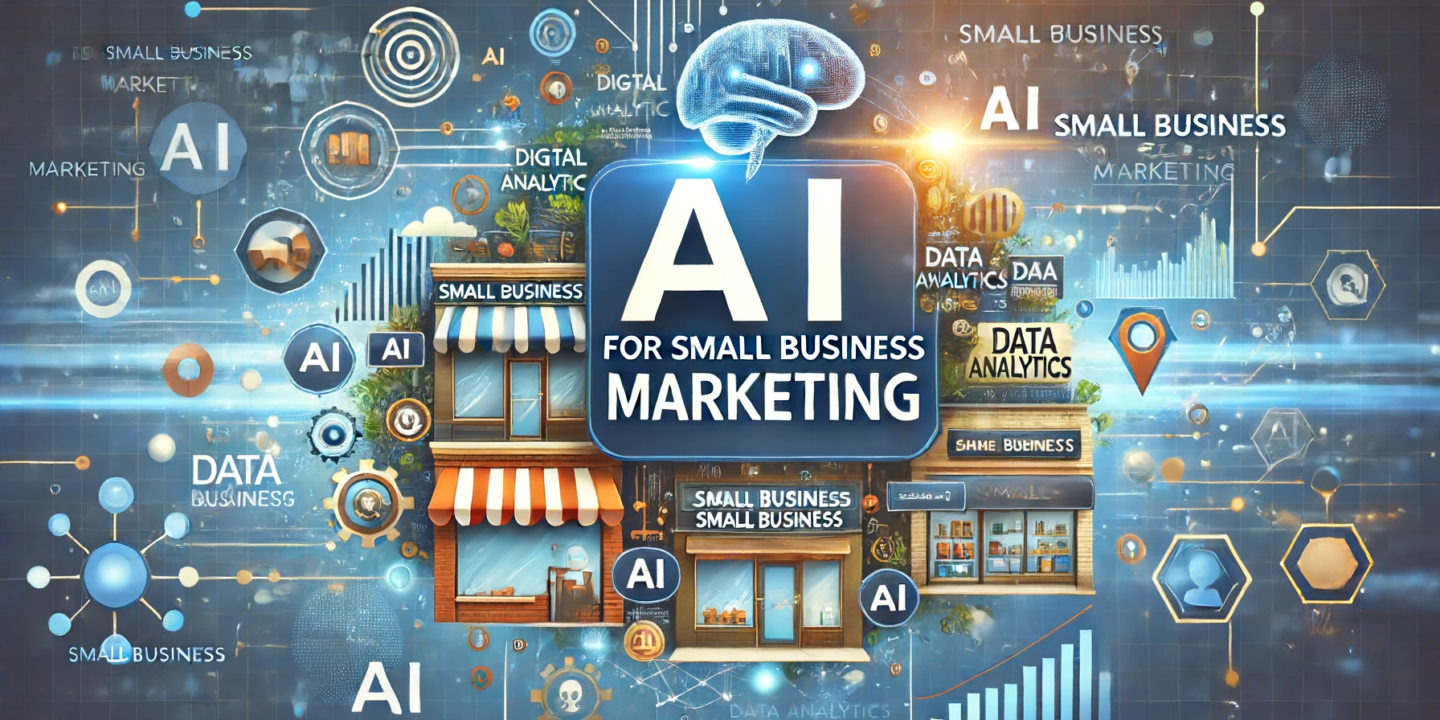
In today’s fast-paced digital world, small businesses constantly seek innovative ways to compete with larger enterprises. One powerful tool that is becoming increasingly accessible and beneficial for small business marketing is Artificial Intelligence (AI). AI has the potential to revolutionise marketing strategies, offering tools and techniques that can help small businesses reach their target audience more effectively and efficiently. This blog will explore how to use AI for small business marketing, its benefits, and practical implementation steps.
What Role Does AI Play In Marketing?
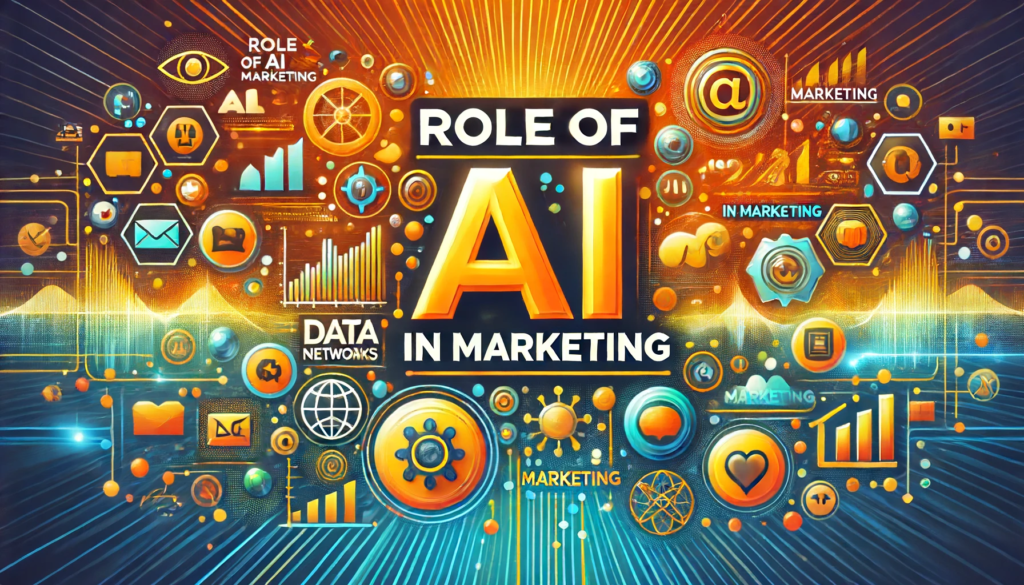
AI is the simulation of human intelligence in machines that are programmed to think and learn like humans. In marketing, AI can analyse large data sets, predict customer behaviour, personalise customer interactions, and automate various marketing tasks. Here are some key AI applications in marketing:
- Predictive Analytics: AI can analyse past customer data to predict future behaviour. This helps businesses anticipate customer needs, optimise marketing campaigns, and improve customer retention.
- Personalisation: AI algorithms can tailor marketing messages and content to individual customers based on their preferences and behaviour. This leads to more engaging and effective marketing efforts.
- Chatbots: AI-powered chatbots can handle customer inquiries 24/7, providing instant responses and improving customer satisfaction. They can also collect valuable customer data for further analysis.
- Content Creation: AI tools can generate content, such as social media posts, blog articles, and product descriptions, saving time and ensuring consistency in messaging.
- Email Marketing: AI can optimise email campaigns by analysing open rates, click-through rates, and customer behaviour to send personalised and timely emails.
- Social Media Marketing: AI can help businesses identify trends, analyse sentiment, and optimise social media campaigns to reach a larger audience.
What Are The Advantages Of AI For Small Business Marketing?
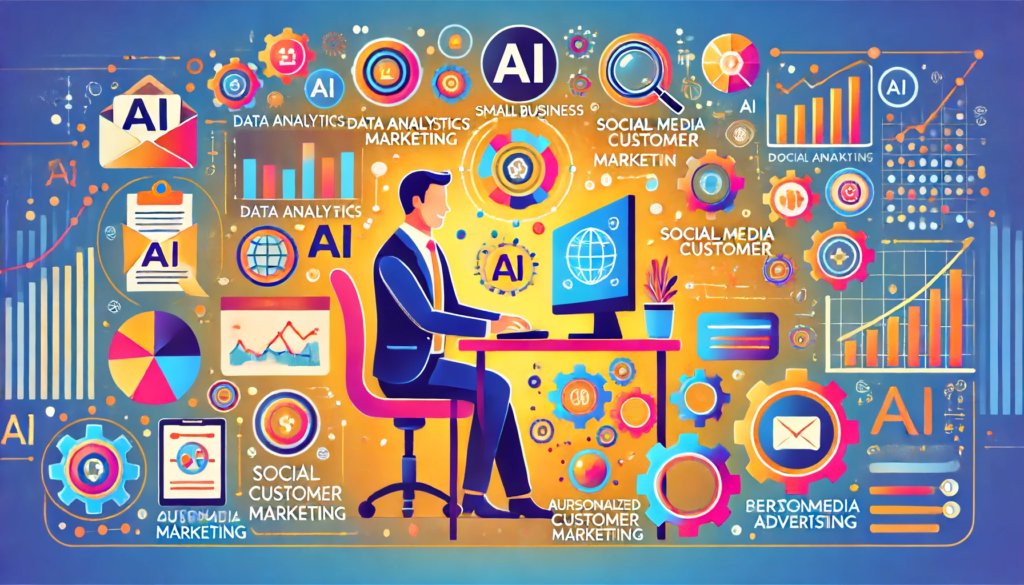
The adoption of AI in marketing offers numerous benefits for small businesses:
- Cost-Effective Marketing: AI can automate repetitive tasks, reducing the need for manual labour and lowering marketing costs.
- Improved Customer Insights: AI can analyse vast amounts of data to provide deeper insights into customer behaviour, preferences, and trends.
- Enhanced Customer Experience: Personalized marketing messages and 24/7 customer support improve customer satisfaction and loyalty.
- Increased Efficiency: AI-powered tools can streamline marketing processes, allowing businesses to focus on strategic activities.
- Competitive Advantage: Small businesses can leverage AI to compete with larger enterprises by delivering more targeted and effective marketing campaigns.
What Are The Practical Steps For Implementing AI In Small Business Marketing?
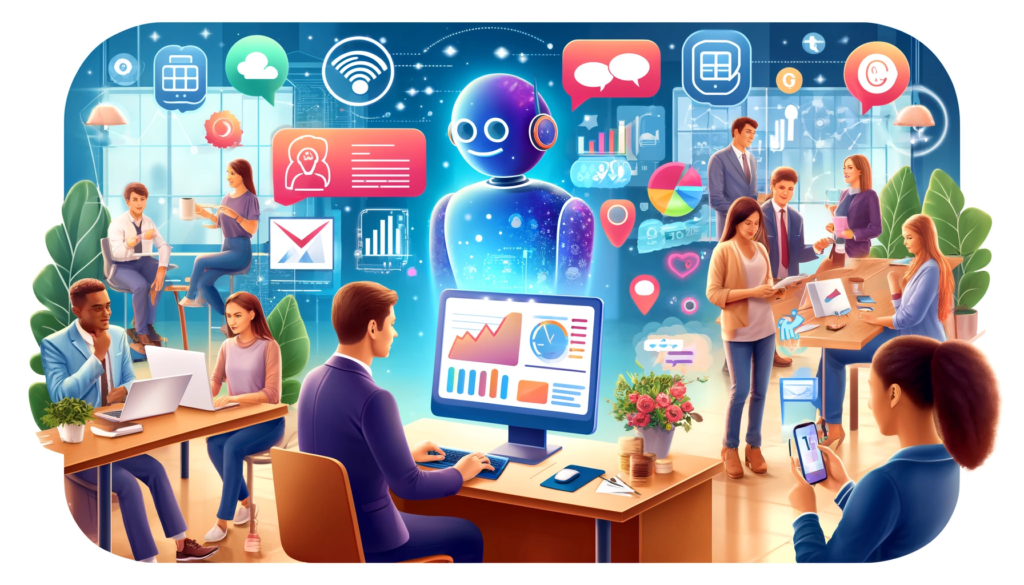
Implementing AI in your marketing strategy may seem daunting, but it can be a smooth and rewarding process with the right approach. Here are some practical steps to get started:
- Identify Your Goals: Define what you want to achieve with AI in your marketing strategy. Are you looking to improve customer engagement, increase sales, or optimise your marketing campaigns? Clear goals will help you choose the right AI tools and measure success.
- Choose the Right Tools: Numerous AI tools are available for different marketing tasks. Research and select tools that align with your goals and budget. Some popular AI tools include:
- HubSpot: An all-in-one marketing platform offering AI-powered email marketing, social media, and CRM features.
- BuzzSumo: An AI-powered content research tool that helps identify trending topics, analyze content performance, and find influencers.
- Canva: An AI-driven design tool for creating marketing graphics and content.
- Mailchimp: An email marketing platform that uses AI to optimise email campaigns.
- Salesforce: An AI-powered CRM tool that helps with sales, marketing, and customer service automation.
- Buffer: A social media management tool with AI capabilities for scheduling, publishing, and analyzing social media posts.
- Chatfuel: A platform for building AI-powered chatbots for Facebook Messenger.
- Integrate AI with Your Existing Systems: Ensure that the AI tools you choose can integrate seamlessly with your existing marketing systems and platforms. This will enable you to leverage AI capabilities without disrupting your current workflows.
- Train Your Team: Educate your marketing team about AI and its potential benefits. Provide training on how to use AI tools effectively and encourage a culture of continuous learning and experimentation.
- Monitor and Measure: Regularly monitor the performance of your AI-powered marketing campaigns. Use analytics and reporting features to measure AI’s impact on your marketing efforts and make data-driven decisions for continuous improvement.
Case Studies: AI Success Stories In Small Business Marketing
To illustrate the impact of AI on small business marketing, let’s look at a few case studies of businesses that have successfully implemented AI in their marketing strategies.
Case Study 1: A Local Coffee Shop
A small, local coffee shop wanted to increase customer engagement and drive more foot traffic to its store. It decided to implement an AI-powered chatbot on its website and social media channels. The chatbot could answer common customer inquiries, provide information about promotions and events, and collect customer feedback.
As a result, the coffee shop saw a significant increase in customer interactions and a 20% increase in foot traffic within the first three months. The AI chatbot also collected valuable data on customer preferences, which the shop used to tailor their marketing campaigns and improve customer satisfaction.
Case Study 2: An Online Boutique
An online boutique specialising in handmade jewellery wanted to enhance their email marketing campaigns to boost sales. They integrated an AI-powered email marketing platform that analysed customer behaviour and preferences to send personalised product recommendations and promotions.
The AI platform optimised email send times and content, resulting in a 25% increase in email open rates and a 30% increase in sales over six months. The boutique also saved time and resources by automating its email marketing processes.
Case Study 3: A Digital Marketing Agency
A small digital marketing agency wanted to improve its social media marketing efforts for clients. It adopted an AI-powered social media management tool that analyzed trends, sentiment, and engagement metrics to optimize content and posting schedules.
The AI tool helped the agency create more relevant and engaging social media content, leading to a 40% increase in social media engagement for their clients. The agency also gained valuable insights into audience preferences, allowing them to refine their marketing strategies further.
How To Overcome Challenges In AI Adoption?
While the benefits of AI in small business marketing are significant, there are also challenges to consider. Here are some common challenges and how to overcome them:
- Cost: Implementing AI tools can be expensive, especially for small businesses with limited budgets. To overcome this, start with affordable AI tools and scale up as you see results. Many AI platforms offer free trials or tiered pricing to accommodate different budgets.
- Data Quality: AI relies on high-quality data for accurate insights and predictions. Ensure that your data is clean, organised, and up-to-date. Invest in data management tools and practices to maintain data quality.
- Technical Expertise: Small businesses may lack the technical expertise needed to implement and manage AI tools. Consider partnering with AI service providers or hiring experts to guide you through the process. Online courses and resources can also help you build your AI knowledge.
- Integration: Integrating AI tools with existing systems can be challenging. Choose AI tools that offer easy integration with your current marketing platforms and provide support for any technical issues that arise.
- Privacy Concerns: AI involves collecting and analysing customer data and raising privacy concerns. Ensure you comply with data privacy regulations and communicate transparently with your customers about how their data is used.
What Are The Future Of AI In Small Business Marketing?
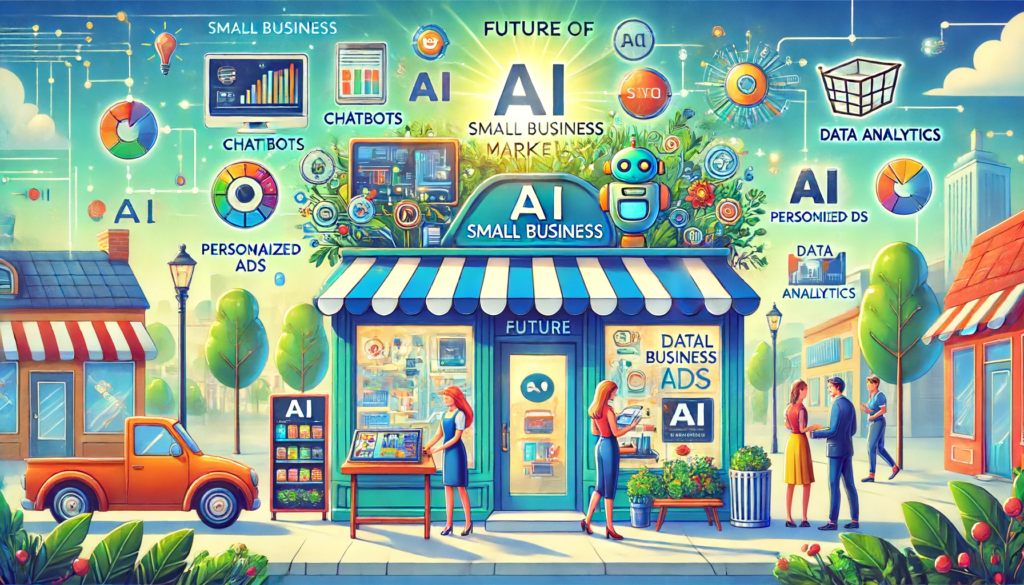
The adoption of AI in small business marketing is still in its early stages, but the future looks promising. We expect even more innovative applications and tools to emerge as AI technology evolves. Here are some trends to watch for in the future of AI-driven marketing:
- Voice Search Optimization: With the rise of voice-activated devices like smart speakers, optimising voice search will become increasingly important. AI can help businesses analyse voice search data and optimise their content accordingly.
- Visual Search: AI-powered visual search allows customers to search for products using images instead of text. This technology can enhance the online shopping experience and drive more sales for small businesses.
- Augmented Reality (AR): AI-powered AR can create immersive shopping experiences by allowing customers to visualise products in their environment before purchasing. This can be particularly beneficial for small businesses in the fashion, furniture, and home decor industries.
- Hyper-Personalization: AI will continue to advance in its ability to deliver hyper-personalized marketing messages based on real-time data. This will enable small businesses to create more meaningful and relevant customer interactions.
- AI-Powered Content Creation: As AI technology improves, we can expect even more sophisticated content creation tools to generate high-quality, human-like content for various marketing channels.
Frequently Asked Questions
Q1. How do I use AI to market my small business?
Ans. AI can help market your small business by personalising customer interactions, optimising email campaigns, analysing customer data, automating social media posts, and utilising chatbots for customer service. Using AI tools for small businesses increases efficiency, enhances customer experience, and provides insights into customer behaviour, ultimately driving more targeted and effective marketing efforts.
Q2. How to use AI for marketing strategy?
Ans. To use AI for marketing strategy, start by defining your goals. Choose AI tools that align with these goals, such as predictive analytics for customer behaviour, personalisation software for tailored content, and automation tools for efficient campaign management. Integrate these tools with your existing systems, train your team, and continuously monitor and refine your strategies based on AI insights.
Q3. How AI can help B2B marketing?
Ans. AI can help B2B marketing by analysing large data sets to identify potential leads, optimising content for targeted audiences, automating repetitive tasks like email campaigns, and providing predictive analytics to forecast market trends. It enhances efficiency, improves lead generation, personalises client interactions, and offers deep insights into buyer behaviour, aiding strategic decision-making.
Q4. Can AI help small businesses?
Ans. Yes, AI can help small businesses by automating tasks, providing customer insights, personalising marketing efforts, and enhancing customer service. It can streamline operations, reduce costs, and improve decision-making processes. AI tools can handle tasks like data analysis, email marketing, social media management, and customer support, making them more efficient and competitive.
Q5. How to start using AI?
Ans. Start using AI by identifying specific business needs, such as improving customer service or marketing efficiency. Research and select AI tools that address these needs, integrate them with your existing systems and provide training for your team. Start small, monitor the results, and scale up as you see the benefits.
Q6. Is AI good or bad for business?
Ans. AI can be both good and challenging for business. It offers benefits like increased efficiency, improved customer insights, and cost savings. However, it also poses challenges such as high implementation costs, data privacy concerns, and the need for technical expertise. Balancing these aspects is crucial for successful AI adoption.
Conclusion
AI is transforming the small business marketing landscape, offering tools and techniques to help businesses reach their target audience more effectively and efficiently. By leveraging AI for predictive analytics, personalisation, chatbots, content creation, email marketing, and social media marketing, small businesses can gain a competitive edge and drive growth.
While there are challenges to overcome, such as cost, data quality, technical expertise, integration, and privacy concerns, the benefits of AI far outweigh the drawbacks. With careful planning, the right tools, and continuous learning, small businesses can successfully implement AI in their marketing strategies and reap the rewards.
The future of AI in small business marketing is bright, with emerging trends like voice search optimisation, visual search, augmented reality, hyper-personalization, and AI-powered content creation set to revolutionise the industry further. By staying ahead of these trends and embracing AI, small businesses can unlock new opportunities for growth and success.
In conclusion, AI is not just a buzzword but a powerful tool that can transform how small businesses market their products and services. By understanding the benefits, overcoming challenges, and staying abreast of emerging trends, small businesses can harness the power of AI to achieve their marketing goals and thrive.





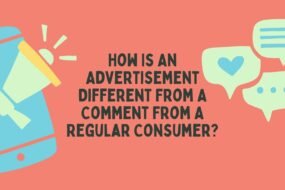

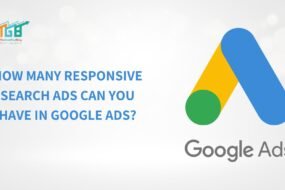
No Comments